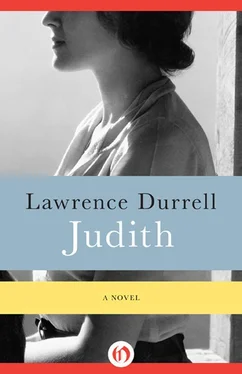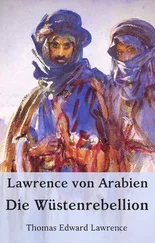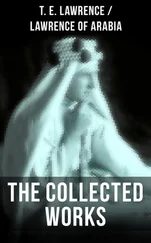A mixture of rage, fright and a sense of injustice brought her very close to tears. Besides, his grip had bruised her. She flew out at him:
“You have no right to treat me like that. To speak to me like that.”
Aaron said grimly: “I have. I am supposed to be in military command of this valley. Look.”
In the light of his torch she saw the reason for his concern, for a man sat bowed over a wireless set, jotting furiously on a pad. She heard the tittering of static which satisfactorily explained the djinns which haunted this forward observation post. She apologized, and his temper cooled.
“I am sorry too,” he said coldly, “but you can’t leave this cave until dusk. I’ll arrange to get the sheep back to the shepherd. You had better sit down somewhere.”
She did as she was told, and sat down on the cold rock. The operator worked furiously for a while and then took off his earphones. He handed across a sheaf of paper covered in block capitals and Aaron groaned. He sat down and clasped his head; then catching her eye, he smiled ruefully.
“We have been listening in to the British talking to their mission. Vital information. But now we are really stuck. With the new military mission they’ve changed code and we can’t break it — even Jerusalem is stumped. We are getting pages and pages of gibberish. And it might be of vital interest. They were talking of giving Daud armoured cars…
His despair made him for a moment seem almost sympathetic. She saw the long ribbon of paper hanging from his fingers and said:
“Can I see?”
He handed it to her without a word, and lit a cigarette. She gazed at the long lines of capitals. She said:
“Would you let me have a big piece of this? I might be able to do something.”
Aaron blew a dispirited streamer of smoke in the air, and said with contempt:
“What do you think you could do?”
Judith felt the sting of his manner.
“Perhaps nothing, but I could try.”
In her mind she was already turning up the laws of recurrence and probability, like a spade turning up earth.
“At any rate, nothing would be lost,” she said, almost humbly. “I could leave these for you in Pete’s safe. Tomorrow.”
Aaron sighed once more.
“If you wish,” he said with indifference.
When dusk fell he allowed her to leave the cave and descend to the river-bank. The rest of the sheep had already started for home with the two boys. She could hear their shrill shouts. Aaron stopped and said:
“Whatever you do, don’t repeat this little excursion, or you are likely to get shot. And keep it secret.”
Then he turned on his heel and strode off. She swore with rage under her breath:
“The bloody self-importance of men!” she said; but then, looking at the papers she had been loaned, her lips set in a grim line. She stayed up until after midnight that night, covering sheaves of paper with calculations until a smile of triumph dawned, for the code yielded. This was to be her answer to the self-important young man. She copied out the scheme neatly in an exercise book, bundled the papers together and turned in. The next morning she gave them to Pete. She explained what they were and spent a quiet morning by the river with her own work. Towards noon, she saw Aaron coming along the river-bank with great excited strides. She watched him with a cool contempt. He was ugly, she thought, and his self-possession had a disagreeable habit of foundering under rebuke, so that he looked like a chastised puppy. He stood before her at last, with his hands outspread apologetically, but smiling.
“Well,” she said at last, “what do you want?” Aaron said:
“I came to apologize and to thank you.”
She looked at him seriously for a moment. Then:
“I accept both.” She grinned.
“I have never been more surprised,” he added.
“You don’t think much of women’s brains?” she asked ironically.
“Most women have none. Admit it.”
“Have most men?”
“Of course, and am I not among the have-nots myself?”
“You are very modest today.”
“I am very grateful indeed.”
He turned abruptly and started to go away. Then a thought struck him and he came striding back.
“Do you ride?”
“I have ridden,” she said.
“Do you like it?”
“I used to.”
He frowned in thought for a moment and then said, with a touch of hesitation:
“Would you ride with me this afternoon? I have to go up to the other end of the valley — couple of hours…
“With pleasure,” she said.
“Good,” he said softly. “Good.”
So it was that she found herself mounted on a fleet white Arab horse, galloping across the greensward of the upper valley with Aaron beside her on his own. They crossed the maze of green rides and climbed to where the silver olive trees began to grow more dense. Here there was a deserted shack of boards in an untended garden, where he dismounted to gather wild flowers.
“This is my country house,” he said with mock pride. “My grandfather built it and lived here for many years. It belongs to me.”
“It is beautiful,” she said.
“When I think of all the work I put into this garden,” he went on ruefully, “as a child. Look at the damn place now. Nothing but weeds.”
“It smells of thyme.”
She rolled over luxuriously in the sunlight and pillowed her head, chewing a blade of grass. He looked at his watch.
“Another five minutes,” he said, and frowned. She groaned.
“Really so soon?”
Aaron sat with his arms round his knees, head bent in thought.
“There’s always too much to do,” he said, “especially for a general without an army — or rather with an army I shall have to borrow.”
“Why don’t you come and live here?”
“If ever I marry I shall.” He laughed. “ Après la guerre .”
“If there is any après about it.”
He lit a cigarette.
“It will end this year or next, I’m sure. But then we shall have to face the music here unless I am mistaken. Somehow we must get Israel born.”
“Haven’t you had enough of this war?”
“Yes.”
“So have I. Too much. Can’t we think about peace a little? I have so much work to do as yet…
“That is just the point,” he said angrily — almost angrily. “You don’t really believe us when you hear our plans for a free Israel.”
“It sounds so problematical. You are so weak. The British are strong, and with their oil interests to worry about…
“You will see,” he said.
“I hope you are right.”
“Israel must get itself born — it must.”
They rode back in silence to the kibbutz. As he reached her down from the saddle he stood for a brief moment with his hands on her shoulders, looking deeply into her eyes.
“Thank you, Judith,” he said softly. “It was a memorable day for me.”
Then, as if of a sudden abashed by his own frankness, he stepped back a pace and added:
“And it was particularly splendid, as I am leaving tonight.”
To her own intense surprise she felt a sudden pang, like a pain; it was as if she had allowed the thought of him to lie neglected and unevaluated in a corner of her mind. It had somehow never occurred to her that he might go away. But why, she asked herself, should such a notion surprise, almost shock her? Aaron was nothing to her. She had come to accept him as part of the landscape, as part of the furniture of her new life here in the kibbutz. To her own amazement, and indeed vexation, she felt herself turn pale, and her voice when she spoke was very far from calm.
“For good?” she said, astonished that the very phrase should weigh so heavily on her tongue.
Читать дальше












